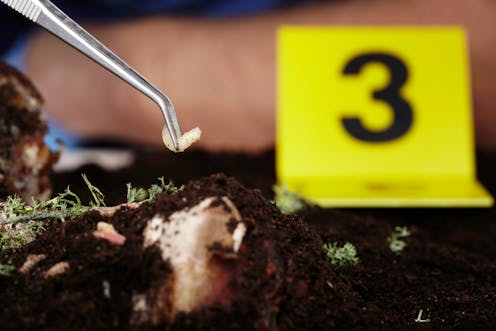Fique off-line com o app Player FM !
Trust Me, I’m An Expert: forensic entomology, or what bugs can tell police about when someone died
Manage episode 243886867 series 1575188

A few episodes ago, we heard from forensic scientists at the Australian Facility for Taphonomic Experimental Research (AFTER) – that’s the official name for what, in books and movies, they would call a body farm. It’s there, at a secret bushland site, researchers are making some surprising discoveries about how donated human bodies decompose in Australian conditions.
One of the researchers there is Professor James Wallman, Head of the School of Life Sciences at the University of Technology Sydney, and one of the nation’s few forensic entomologists.
It’s his job to unpack little clues left behind by insects – including the much maligned blowfly – that can help police solve crimes when a body is found.
Today, James Wallman explains how and why insects have a really profound influence on decomposition.
We’re also re-broadcasting a clip from Maiken Ueland, the interim director of the AFTER facility, on how research underway there is changing what we thought we knew about determining time since death.
And if you’re interested in finding out more about how to donate your body for such research, you can start here.
New to podcasts?
Podcasts are often best enjoyed using a podcast app. All iPhones come with the Apple Podcasts app already installed, or you may want to listen and subscribe on another app such as Pocket Casts (click here to listen to Trust Me, I’m An Expert on Pocket Casts).
You can also hear us on Stitcher, Spotify or any of the apps below. Just pick a service from one of those listed below and click on the icon to find Trust Me, I’m An Expert.
Read more: Trust Me, I'm An Expert: what science says about how to lose weight and whether you really need to
Additional audio
Kindergarten by Unkle Ho, from Elefant Traks.
Backyard by David Szesztay from Free Music Archive
Images
Shutterstock
52 episódios
Manage episode 243886867 series 1575188

A few episodes ago, we heard from forensic scientists at the Australian Facility for Taphonomic Experimental Research (AFTER) – that’s the official name for what, in books and movies, they would call a body farm. It’s there, at a secret bushland site, researchers are making some surprising discoveries about how donated human bodies decompose in Australian conditions.
One of the researchers there is Professor James Wallman, Head of the School of Life Sciences at the University of Technology Sydney, and one of the nation’s few forensic entomologists.
It’s his job to unpack little clues left behind by insects – including the much maligned blowfly – that can help police solve crimes when a body is found.
Today, James Wallman explains how and why insects have a really profound influence on decomposition.
We’re also re-broadcasting a clip from Maiken Ueland, the interim director of the AFTER facility, on how research underway there is changing what we thought we knew about determining time since death.
And if you’re interested in finding out more about how to donate your body for such research, you can start here.
New to podcasts?
Podcasts are often best enjoyed using a podcast app. All iPhones come with the Apple Podcasts app already installed, or you may want to listen and subscribe on another app such as Pocket Casts (click here to listen to Trust Me, I’m An Expert on Pocket Casts).
You can also hear us on Stitcher, Spotify or any of the apps below. Just pick a service from one of those listed below and click on the icon to find Trust Me, I’m An Expert.
Read more: Trust Me, I'm An Expert: what science says about how to lose weight and whether you really need to
Additional audio
Kindergarten by Unkle Ho, from Elefant Traks.
Backyard by David Szesztay from Free Music Archive
Images
Shutterstock
52 episódios
Semua episode
×Bem vindo ao Player FM!
O Player FM procura na web por podcasts de alta qualidade para você curtir agora mesmo. É o melhor app de podcast e funciona no Android, iPhone e web. Inscreva-se para sincronizar as assinaturas entre os dispositivos.










